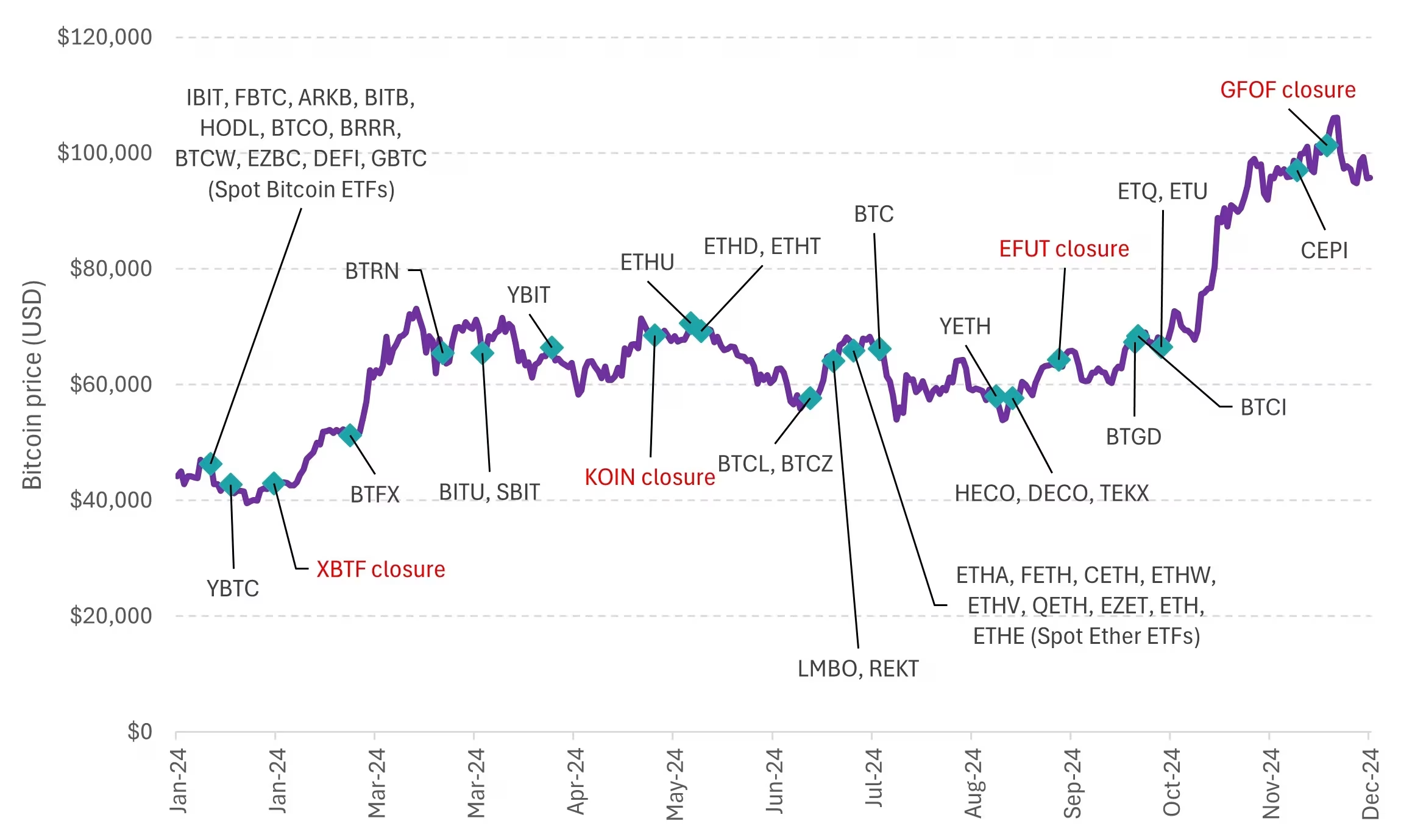For the first decade of Bitcoin existence, ETFs were mythical ghosts on the horizon that will move price of Bitcoin "to the moon." In February 2021, the first ETF was finally accepted in Canada (BTCC), and seven months later ProShares launched BITO in the US. Rewinding forward, just 18 months since the approval 12 US spot Bitcoin ETFs account for $150B+ AUM, with BlackRock IBIT alone hitting $80B, but the landscape is much bigger.

In fact, there are so many of them that regular investor can be confused:
- Which one should you choose?
- Why even choose it over just buying Bitcoin?
- What's the difference between spot and future ETFs?
- Which one is available in Europe?
Let's dive in.
Why ETF?
For institutional investors choosing exposure to Bitcoin via ETF is often just necessity since they cannot hold cryptocurrencies directly, but are there any reasons why an individual investor should consider them?
There are two main reasons:
Easy Portfolio Management
You can buy Bitcoin ETFs in your regular brokerage account alongside stocks. No need to deal with crypto exchanges, wallets, or complicated rebalancing between different platforms.
Tax-Advantaged Accounts
Most retirement and pension accounts (like 401(k) in the US, ISAs in the UK, or PEAs in France) can't hold actual Bitcoin directly. But they can hold Bitcoin ETFs. This lets you get Bitcoin exposure while keeping the tax benefits of these special accounts.
Spot, Futures, ETP…?
When you start looking at available options, the first thing to understand are differences between three main types of Bitcoin investment products, because they work very differently:
Spot ETF buys and holds actual Bitcoin. When Bitcoin goes up $1, your ETF goes up roughly $1. Spot ETFs are usually best for most people - they're simple and track Bitcoin closely.
Futures ETF buys a contract to own Bitcoin in the future, not actual Bitcoin. It can lose money even when Bitcoin goes up due to "rolling" cost. Available in the US since 2021. Example: BITO (ProShares), BTF (Valkyrie).
ETP (Exchange Traded Product) works like spot ETF but is more common in Europe. It buys and holds actual Bitcoin. Similar tracking to spot ETF. Example: WisdomTree Physical Bitcoin, iShares Bitcoin ETP.
ETC (Exchange Traded Commodity), but in the cryptocurrency world, it's often rebranded as Exchange Traded Crypto. In practice, there's no difference between ETC and ETP for an investor.
ETN (Exchange Traded Note) is basically an IOU from a bank promising to pay you Bitcoin's performance. If the bank fails, you lose everything. There's really no good reason for an individual investor to choose ETN.
Tax Benefits
If you trade Bitcoin a lot in the US, futures ETFs like BITO give you better tax rates. You pay lower taxes on 60% of your gains, even if you only held the ETF for a short time.
Income Generation
Some Bitcoin ETFs can make extra money when Bitcoin futures cost more than regular Bitcoin prices. The ETF also earns interest on the cash it holds.
Products
Spot Bitcoin ETFs
As of September 2025, there are 12 spot Bitcoin ETFs available in the US, which directly hold Bitcoin as their underlying asset. These were primarily approved by the SEC in early 2024, with the Grayscale Bitcoin Mini Trust (BTC) launched later that year to offer a lower-fee alternative to the original Grayscale fund. Below is a complete list, sorted by expense ratio (lowest to highest).
| Ticker | Fund Name | Expense Ratio |
|---|---|---|
| BTC | Grayscale Bitcoin Mini Trust | 0.15% |
| EZBC | Franklin Bitcoin ETF | 0.19% |
| BITB | Bitwise Bitcoin ETF | 0.20% |
| HODL | VanEck Bitcoin ETF | 0.20% |
| ARKB | ARK 21Shares Bitcoin ETF | 0.21% |
| IBIT | iShares Bitcoin Trust | 0.25% |
| FBTC | Fidelity Wise Origin Bitcoin Fund | 0.25% |
| BTCW | WisdomTree Bitcoin Fund | 0.25% |
| BTCO | Invesco Galaxy Bitcoin ETF | 0.25% |
| BRRR | Valkyrie Bitcoin Fund | 0.25% |
| HBTC.BH | Hashdex Bitcoin ETF | 0.25% |
| GBTC | Grayscale Bitcoin Trust | 1.50% |
Futures-Based and Strategy Bitcoin ETFs
In addition to spot ETFs, there are several futures-based or indirect Bitcoin exposure ETFs, which do not hold Bitcoin directly but invest in Bitcoin futures contracts, mining stocks, or blockchain-related assets. These provide alternative exposure but may underperform spot ETFs due to futures roll costs. Here are the key ones as of September 2025.
| Ticker | Fund Name | AUM (Market Cap) | Expense Ratio |
|---|---|---|---|
| BITS | Global X Blockchain & Bitcoin Strategy ETF | Bitcoin futures + blockchain stocks | 0.65% |
| BITO | ProShares Bitcoin Strategy ETF | Bitcoin futures | 0.95% |
| DEFI | Hashdex Bitcoin Futures ETF | Bitcoin futures | 0.90% |
What about Europe?
Although traditional spot Bitcoin ETFs are not permitted in Europe due to strict UCITS regulations, there are a variety of Bitcoin Exchange-Traded Products (ETPs) and Exchange-Traded Notes (ETNs) that function similarly by providing direct or synthetic exposure to Bitcoin's price. These products are actively traded on major European stock exchanges, including the SIX Swiss Exchange (Switzerland), Xetra and Börse Frankfurt (Germany), and others.
| ISIN | Fund Name | Expense Ratio |
|---|---|---|
| GB00BJYDH287 | WisdomTree Physical Bitcoin ETP | 0.15% |
| XS2940466316 | iShares Bitcoin ETP | 0.15% |
| DE000A4AER62 | Bitwise Core Bitcoin ETP | 0.20% |
| CH1199067674 | 21Shares Bitcoin Core ETP | 0.21% |
| GB00BLD4ZL17 | CoinShares Physical Bitcoin | 0.25% |
| XS2376095068 | Invesco Physical Bitcoin | 0.25% |
| SE0025012032 | Virtune Bitcoin Prime ETP | 0.25% |
| GB00BLBDZV05 | Global X Bitcoin ETP | 0.29% |
| XS2434891219 | Fidelity Physical Bitcoin ETP | 0.35% |
| CH1315732250 | Xtrackers Galaxy Physical Bitcoin ETC Securities | 0.35% |
| CH0558875933 | AMINA Bitcoin ETP | 0.75% |
| DE000A3GK2N1 | DDA Physical Bitcoin ETP | 0.95% |
| DE000A28M8D0 | VanEck Bitcoin ETN | 1.00% |
| DE000NXTA018 | nxtAssets Bitcoin direct ETP | 1.00% |
| CH0454664001 | 21Shares Bitcoin ETP | 1.49% |
| SE0020845709 | Virtune Bitcoin ETP | 1.49% |
| GB00BQ991Q22 | Valour Bitcoin Physical Carbon Neutral ETP | 1.49% |
| DE000A27Z304 | Bitwise Physical Bitcoin ETP | 2.00% |
How to pick the best Bitcoin ETF?
Which Bitcoin ETF is best for you? Here are our top picks for US and European investors:
US
When choosing a Bitcoin ETF in the US, focus on low fees (under 0.25%), high liquidity (measured by trading volume and assets), and trusted issuers like BlackRock or Fidelity. All US spot ETFs hold actual Bitcoin, so avoid futures-based ones like BITO that can lag due to extra costs.
BTC (Grayscale Bitcoin Mini Trust) — Lowest ongoing fee at 0.15%, making it best for long-term holders focused on minimizing costs. Smaller than the others but still solid with $10B+ assets.
IBIT (iShares Bitcoin Trust) — The biggest and most liquid option with $86B in assets. BlackRock's reputation makes it ideal for large investors who want easy trading. Fee is 0.25% but temporarily reduced to 0.12% until January 2025.
FBTC (Fidelity Wise Origin Bitcoin Fund) — Great balance of cost and reliability with $50B+ assets. Perfect if you already use Fidelity for other investments. Same 0.25% fee as IBIT.
Europe
European options are smaller overall but work similarly to US spot ETFs. Look for physically backed ETPs with low fees (under 0.25%) and good exchange listings like Xetra or SIX. Note that some products are only available to professional investors, though retail access is expanding.
WBIT (WisdomTree Physical Bitcoin) — Low 0.15% fee with $1B+ assets and strong track record. Good choice for cost-conscious long-term investors.
IB1T (iShares Bitcoin ETP) — BlackRock's European product with promotional 0.15% fee until December 2025, then 0.25%. Best for those wanting premium brand security.
BTCE (Bitwise Physical Bitcoin ETP) — Highest European liquidity with $1.3B assets and 5-year track record. Great for active traders who want flexibility, though fee is slightly higher at 0.20%.
Conclusion
While ETFs offer a tempting and convenient way to get "Bitcoin exposure," it's worth remembering that Bitcoin represents more than just an investment vehicle.
Jeff Park's Radical Portfolio Theory highlights the systemic risk inherent in all "compliant" assets. True diversification should consider not only portfolio volatility but also the risk of losing access to your assets. Storing your entire wealth in one brokerage account carries substantial risk.
However, if you keep a significant portion of your Bitcoin safely on a hardware wallet, adding an ETF to your portfolio can provide useful flexibility for rebalancing and tax advantages through retirement accounts.
